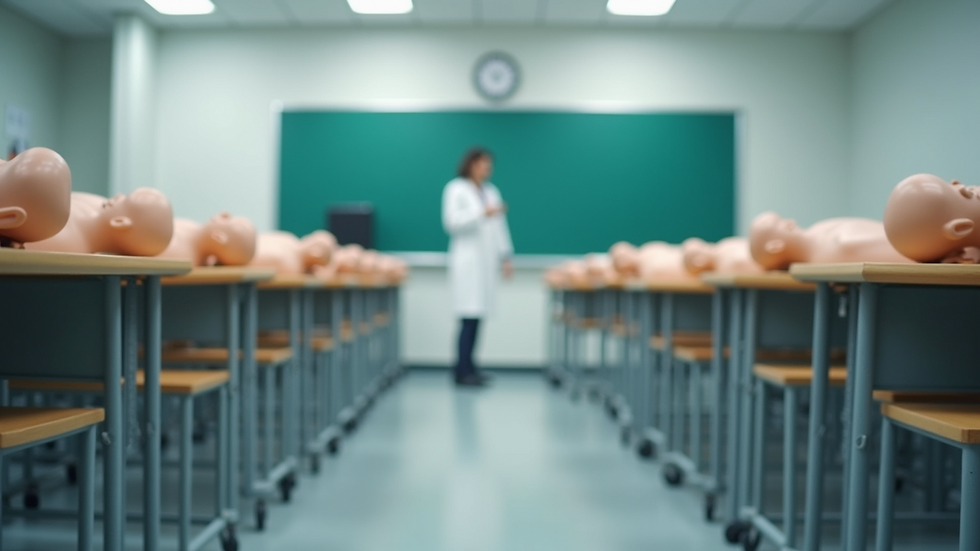CPR Classes | Cardiac Arrest Follows Years of Misdiagnoses
- May 2, 2022
- 3 min read

Rose Blackwood had spent the afternoon judging middle school and high school science projects and was bidding a colleague goodbye when she had an overwhelming feeling of dizziness.
The next thing she remembers was waking up a day later in the hospital as a nurse removed the ventilator.
“I saw my husband, daughter and sister at the foot of my bed and I asked if I was dead,” she recalled.
A day earlier, on Dec. 8, 2010, Blackwood had a sudden cardiac arrest, an abrupt loss of heart function caused by a malfunction of the heart’s electrical signals.
Her coworker, Bruce Kay, immediately began Hands-Only CPR, continuing with compressions to keep the blood pumping to Blackwood’s vital organs until paramedics arrived 10 minutes later.
Emergency medical crews used an automated external defibrillator, or AED, to shock Blackwood’s heart so that it could resume a normal rhythm. At the hospital, she got an implantable cardioverter defibrillator, ICD, to automatically shock her heart if it ever went into a life-threatening heart rhythm again.
Blackwood, who lives in Boynton Beach, Florida, was lucky. Cardiac arrest is a leading cause of death, with about 326,000 Americans having an emergency medical services-assessed cardiac arrest outside the hospital each year. Although bystander CPR can double or triple a person’s chance of survival, fewer than half receive it, according to the American Heart Association.
Often, a person who has a cardiac arrest experiences no symptoms just prior to the event. But looking back, Blackwood, now 54, said there had been signals for years that something was wrong.
As far back as five years, Blackwood remembers feeling unusually tired all the time as she tried to juggle work and three kids.
“All the moms would be taking their kids to the pool, but I’d have to lie down so I’d have the energy to make dinner,” she said.
She was at the doctor every six months, trying to figure what was causing her symptoms, which also included heart palpitations and uncontrollable sweating. She also felt extreme discomfort on her left side when lying on her stomach.
“I was always feeling horrible,” she said. “They kept telling me it was just a symptom of premenopause.”
Blackwood never considered asking for a second opinion. “I never thought one was needed,” she said. “Premenopausal symptoms I thought they were.”
She kept herself at a healthy weight, tried to stay active and had quit smoking three years prior, and her blood pressure was always normal when tested.
Then a week before her cardiac arrest, Blackwood felt numbness in her right arm, something doctors told her was probably carpal tunnel syndrome.
Following her cardiac arrest, Blackwood was diagnosed with cardiomyopathy, which is an enlarged heart, along with ventricular tachycardia, ventricular fibrillation and heart failure.
Her ICD has gone off three times, all while at the 2014 Heart Walk in West Palm Beach. Blackwood had wanted to end the event strong and sprinted to the finish line.
“The minute I stopped, it shocked me,” she said. It went off two more times before paramedics arrived. She later learned the device had misread her heart rate and required adjustment.
The experience led Blackwood to become a strong advocate for bystander CPR. At her job with Florida’s Department of Environmental Protection, Blackwood coordinates CPR and AED training classes for her colleagues.
Luckily, Kay, the coworker who helped save Blackwood, had taken a recommended refresher course on CPR a few weeks before Blackwood collapsed. Both are now training to become CPR and first aid instructors.
In addition to urging others to become trained in CPR, Blackwood encourages women to be undaunted when they feel something is wrong with their health and to be more aware of their own heart health.
“If you know you don’t feel good, be persistent and continue talking to your doctor,” she said. “Never in a million years did I think I’d have heart disease.”
Learn, Enjoy and Save Life. HealthForce Training Center offer services such as Basic Life Support (BLS), Advance Cardiovascular Life Support (ACLS), Pediatric Advance Life Support (PALS), CPR AED, Pediatric First Aid CPR AED and First Aid CPR AED. Read more of our blogs.
Source(s):





AV在线看 AV在线看;
自拍流出 自拍流出;
国产视频 国产视频;
日本无码 日本无码;
动漫肉番 动漫肉番;
吃瓜专区 吃瓜专区;
SM调教 SM调教;
ASMR ASMR;
国产探花 国产探花;
强奸乱伦 强奸乱伦;
AV在线看 AV在线看;
自拍流出 自拍流出;
国产视频 国产视频;
日本无码 日本无码;
动漫肉番 动漫肉番;
吃瓜专区 吃瓜专区;
SM调教 SM调教;
ASMR ASMR;
国产探花 国产探花;
强奸乱伦 强奸乱伦;
代发外链 提权重点击找我;
蜘蛛池 蜘蛛池;
谷歌马甲包/ 谷歌马甲包;
谷歌霸屏 谷歌霸屏;
谷歌霸屏 谷歌霸屏
蜘蛛池 蜘蛛池
谷歌快排 谷歌快排
Google外链 Google外链
谷歌留痕 谷歌留痕
Gái Gọi…
Gái Gọi…
Dịch Vụ…
谷歌霸屏 谷歌霸屏
负面删除 负面删除
币圈推广 币圈推广
Google权重提升 Google权重提升
Google外链 Google外链
google留痕 google留痕
代发外链 提权重点击找我;
游戏推广 游戏推广;
Fortune Tiger Fortune Tiger;
Fortune Tiger Slots Fortune…
谷歌马甲包/ 谷歌马甲包;
谷歌霸屏 谷歌霸屏;
מכונות ETPU מכונות ETPU;
;ماكينات اي تي بي…
آلات إي بي بي…
ETPU maşınları ETPU maşınları;
ETPUマシン ETPUマシン;
ETPU 기계 ETPU 기계;
google seo google seo技术飞机TG-cheng716051;
03topgame 03topgame
gamesimes gamesimes;
Fortune Tiger Fortune Tiger;
Fortune Tiger Slots Fortune Tiger…
Fortune Tiger Fortune Tiger;
EPS машины EPS машины;
Fortune Tiger Fortune Tiger;
EPS Machine EPS Cutting Machine;
EPS Machine EPS and EPP…
EPP Machine EPP Shape Moulding…
EPS Machine EPS and EPP…
EPTU Machine ETPU Moulding Machine
EPS Machine EPS Cutting Machine;